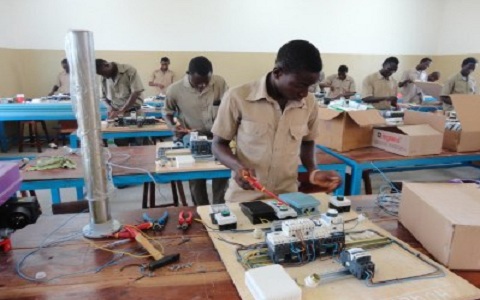

Unemployment has been a problem that has contributed to poverty among the populace over the years.
Many youths who graduated from tertiary institutions roam the streets endlessly looking for jobs without success.
While some continued to trudge on with the hope of a better tomorrow, others have become frustrated and disillusioned.
Aside the aforementioned, some of these youths with nothing to do have been lured into crime, drug use and other nefarious activities just as the saying that an idle hand is the devil’s workshop.
Furthermore, many able-bodied and highly qualified persons who could not secure employment remain economically dependent on their parents and guardians.
To address this problem therefore, there is need to encourage youths to learn vocations or skills for them to be self-employed and financially independent.
Revitalizing vocational and technical education in the country will help to bridge this gap.
Technical education is the aspect of education that involves the acquisition of techniques and application of the knowledge of science for the improvement of man’s surrounding.
Vocational education on its part prepares students to be relevant in all spheres of life as they are prepared and exposed to different career options.
Learners also have the opportunity to become specialists in a particular field whereby they could contribute meaningfully to the nation’s economic growth.
It is important to focus on this level of education as most industrialized nations of the world got to where they are today by developing vocational competencies in all areas.
It is also imperative to link training in the university with vocational and technical training.
Acquiring technical or vocational skills would reduce unemployment and increase productivity.
Government at all levels should key into the relevance of technical and vocational education to develop the nation.
This is important now more than ever before if the country really wants to belong to the group of developed countries in the world.
Training in skills and vocation should be encouraged right from the nation’s secondary schools.
Government cannot continue to fold its arms in view of recent comment by the Registrar and Chief Executive of the Teachers’ Registrar Council of Nigeria, Professor Josiah Ajiboye, that two hundred and seventy three technical teachers are required in the nation’s public school system to meet the aspiration of one teacher to twenty pupils’ ratio of the government.
Findings show that there are over twenty thousand public secondary schools without teachers in technical subjects.
It is however heartwarming the pronouncement by the permanent secretary Ministry of Education, Mr. Sonny Echono that the federal government would establish six new technical education colleges before the end of the year and ten additional ones in the next three years.
This will no doubt empower youths with necessary skills to be self reliant and employers of labour.
More polytechnics, monotechnics, vocational and other innovation enterprise institutions should be established while poor remuneration of teachers should be addressed to woo more people into the teaching profession.
Anthonia Akanji